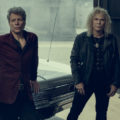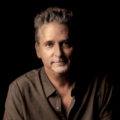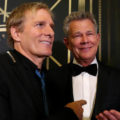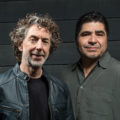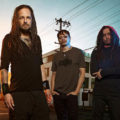Vocal dynamo Jeff Scott Soto discusses his melodic Journey to “Wide Awake (In My Dreamland)”
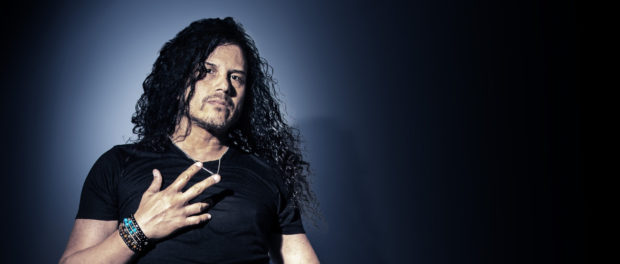 Photos provided by Lexie Boezeman Cataldo – In Joy Photography
Photos provided by Lexie Boezeman Cataldo – In Joy Photography
Ever since he landed on the global map as the premiere vocalist for Swedish guitar giant Yngwie Malmsteen’s Rising Force at a mere 18-years-old, Jeff Scott Soto became a mainstay in many circles of melodic rock.
A list of more than 85 contributions includes current membership in symphonic superstars Trans-Siberian Orchestra and progressive metal supergroup Sons Of Apollo (featuring players from Dream Theater, Mr. Big and more), while he even notched a season as the official lead singer for Journey in the back half of the 2000s.
All the while, Soto’s solo career marched on, culminating in “Wide Awake (In My Dreamland),” a double-decker new project featuring a set of studio material recorded and written with Alessandro Del Vecchio (Hardline, Jorn, Revolution Saints), along with a bonus live concert recording from the Frontiers Rock Festival in 2019.
The native New Yorker of Puerto Rican descent gave Chicago Concert Reviews an inventory of it all, including the blessing in disguise of forced time off, stepping into the theatrical shoes of TSO and unwillingly going his “Separate Ways” with some Rock and Roll Hall of Famers, yet ultimately being content in the way his cards fell (dating all the way back to local Aragon Ballroom beginnings).
Does it feel like lucky number seven in terms of solo albums or have you lost count by now given your quantity of collaborations?
 Jeff Scott Soto: A bit of both actually [laughs]. I’ve done so many things, I forget how many things I’ve done. Even my wallet doesn’t reflect the amount of things that I’ve done. I should be as rich as Bill Gates is at this point with the amount of records I’ve done, but I’m lucky to hold Bill Gates’ suitcases [laughs]. But yeah, I’m blessed that this is [solo album seven]. Of course I’m joking. It’s never been about money for me. I’ve always wanted to make a living at doing this and not have to get a day job, so I’m lucky in that respect that I’m still here 35-plus years later. I’m still doing what I love doing, and the fact that people still want to hear what I’m doing, that’s great.
Jeff Scott Soto: A bit of both actually [laughs]. I’ve done so many things, I forget how many things I’ve done. Even my wallet doesn’t reflect the amount of things that I’ve done. I should be as rich as Bill Gates is at this point with the amount of records I’ve done, but I’m lucky to hold Bill Gates’ suitcases [laughs]. But yeah, I’m blessed that this is [solo album seven]. Of course I’m joking. It’s never been about money for me. I’ve always wanted to make a living at doing this and not have to get a day job, so I’m lucky in that respect that I’m still here 35-plus years later. I’m still doing what I love doing, and the fact that people still want to hear what I’m doing, that’s great.
What’s the meaning behind the title “Wide Awake (In My Dreamland)”?
Soto: I came up with the title around December when I actually wrote the lyrics to the song. I liked the way it resonated, especially the lyric itself for the song. The title of the album resonates more towards world affairs, more so U.S. affairs. We’ve been living in a kind of dream bubble for quite some time. And I don’t even want to equate it to the last four years because that would be unfair to say that nobody else was contributing to this bubble. But I will say, especially recently, the world is in a state. When you add all the civil unrest, to the political division, to the religious [differences], to social injustice, there are so many different things that I can’t believe I’m still seeing in 2020. As far as I’m concerned, that’s what’s reflecting the fact this can’t be real. I must be dreaming, but in the end of this, it’s absolutely real, even though it seems like we’re living in a dreamland at the moment. Everybody thinks I named the album because of the whole COVID, and lockdown, and everything. It just happened to fan out even more now because of that.
You mentioned getting the ball rolling in December. What was your timeline for finishing the album?
Soto: It was discussed in April of 2019 when I visited Frontiers Festival and I had a sit down with the label. We had breakfast the next day after we did our performance. They said it was time to start thinking about a new solo record and suggested I work with Alessandro Del Vecchio, who’s somebody I’ve known for the past 15 years, but haven’t really worked with him. He’s worked with so many people that I know and respect, and he’s done some amazing, incredible, respectful work as well, so I thought it was a fantastic idea to team us up and see what we could come up with. Alessandro wrote all the music, demoed all the music and all of my vocal performances were done to his demos. He played guitar solos and he played everything on these initial demos of these songs. They sound pretty damn good, so they were good enough to get my vocals done to them.
I started writing the lyrics and melodies while I was doing the TSO tour because I had a SOTO tour to finish in September going into October. Then I went out with TSO for those two months, came home and I literally had 15 days to knock out 11 songs after coming off these massive tours. My voice was toast man. You could hear how tired I was on the original versions of those songs that I sang. COVID was a blessed event for me cause not only were we able to delay the release, it gave me the opportunity to revisit some of the things I would’ve been so bummed if they were released with the original vocals, so I got lucky on both fronts. I [originally] knocked out the vocals in two weeks and then I started the Sons Of Apollo tour [at the start of 2020] and there was no real time to come back home and fix anything. My only time home was coming back from the European tour four shows deep. We had to cancel it because COVID began.
You’ve always bounced between rockers and ballads within a variety of styles. How would you describe the make-up of this album?
 Soto: Alessandro wrote all the music. My forte is lyrics and melody. I stopped writing music, or being part of the music writing and the composing of the songs, after my “Lost In The Translation” album back in 2005. My skills on the guitar and keyboards are limited, so I would rather work with killer musicians who are also great songwriters cause I know the songs are gonna stand out more if I have a bad a– guitar player playing and coming up with riffs that I could never dream of as a limited guitar player. My process now is only to complete the songs when it comes to the lyrics and the melodies, so this is no exception. I got to just do what I do best… I just don’t like being a one-trick pony. I don’t want to be seen as a metal singer, as a ballad singer or as a hard rock singer. I want to be all of the above, kind of where Queen influenced me.
Soto: Alessandro wrote all the music. My forte is lyrics and melody. I stopped writing music, or being part of the music writing and the composing of the songs, after my “Lost In The Translation” album back in 2005. My skills on the guitar and keyboards are limited, so I would rather work with killer musicians who are also great songwriters cause I know the songs are gonna stand out more if I have a bad a– guitar player playing and coming up with riffs that I could never dream of as a limited guitar player. My process now is only to complete the songs when it comes to the lyrics and the melodies, so this is no exception. I got to just do what I do best… I just don’t like being a one-trick pony. I don’t want to be seen as a metal singer, as a ballad singer or as a hard rock singer. I want to be all of the above, kind of where Queen influenced me.
What made you decide to include a live concert as a bonus part of the collection?
Soto: I worried that cramming 50 minutes of the best of Jeff Scott Soto show, which after cutting all the fat from the set ended up as a 42-minute album, was not going to be valid enough to warrant as a standalone product…So they came up with a perfect solution of putting it out digitally so people can pick and choose, but also give it to people who are still supporting and only buying physical product…It’s just more of an incentive to buy the record, to get a bonus disc out of it. I couldn’t be more pleased with the balance of this decision…
Can you take us back to the day it was recorded?
Soto: Every time I do the Frontiers Rock Festival, I swear it’s like a wedding reception. Anybody who’s been married, when you get to the reception, it’s almost like a blur when you get to the end of the night. You’re exhausted and you’re like “oh my God, what the hell just happened?” You feel like it was a big, blurry dream. You saw so many people, friends, colleagues, family, etc. Almost everybody on the roster are friends of mine, colleagues and people I don’t get to see that often because we’re all so busy. To put us all under one umbrella, I’m constantly going from one end of the backstage to the other all day. The two days I was there, it was just a non-stop reunion, so at the end of it, I’m like “oh my God, we played a set didn’t we?” It truly is more of a blur. That’s why I’m so happy even listening back to this thing when Alessandro mixed it. It was just a blessing to be able to remember it based on having this recording of it now.
Do you have a lasting Chicago concert memory to share?
 Soto: One of the most important shows to me, and memorable as far as Chicago is concerned, was at the Aragon Ballroom. I played there with Yngwie Malmsteen in 1986 the night that Cliff Burton from Metallica died. I wasn’t a Metallica fan then. I didn’t really care so much for their music, but I saw how important that man and that band was to so many people that I automatically felt for them. I remember even walking outside. I didn’t realize that [fans] were lined up around the block prior to the show. I was stepping out of the backstage just getting some air, and I turned the corner of the theatre, and there was a horde of hundreds and hundreds of fans waiting in line for the doors to open. They immediately recognized me and they were all cheering. I’m brand new to the game, I’m green and I’ve never toured before. I went and did high fives, and shook hands, and met as many as I could in the course of the time I was outside. I’ll never forget that day and night. It meant more to me based on it was one of my first times in Chicago, and something so deep and so heavy happened. That’s probably why it means so much more to me today.
Soto: One of the most important shows to me, and memorable as far as Chicago is concerned, was at the Aragon Ballroom. I played there with Yngwie Malmsteen in 1986 the night that Cliff Burton from Metallica died. I wasn’t a Metallica fan then. I didn’t really care so much for their music, but I saw how important that man and that band was to so many people that I automatically felt for them. I remember even walking outside. I didn’t realize that [fans] were lined up around the block prior to the show. I was stepping out of the backstage just getting some air, and I turned the corner of the theatre, and there was a horde of hundreds and hundreds of fans waiting in line for the doors to open. They immediately recognized me and they were all cheering. I’m brand new to the game, I’m green and I’ve never toured before. I went and did high fives, and shook hands, and met as many as I could in the course of the time I was outside. I’ll never forget that day and night. It meant more to me based on it was one of my first times in Chicago, and something so deep and so heavy happened. That’s probably why it means so much more to me today.
[Had it not been for Yngwie], my life and career probably would’ve taken a different course. I’m not saying I maybe wouldn’t have made it or wouldn’t have had the opportunities that I had have, but it certainly would’ve been a different course. I owe Yngwie my life in terms of giving me that opportunity and hearing that I was ready to front him. I was 18 when I joined him. I didn’t have the world stage experience. All I had was the voice and the fact that I was tall enough for my age to make you think that I looked older, acted older and sang older…
How did a season of singing for Journey factor into your career? Was it just the right amount of time or do you wish it would’ve been longer?
Soto: It ended in a way that wasn’t favorable to me in any respect because of whatever the reasons that I still don’t know to this day were that I was let go. It didn’t offer me the opportunity to necessarily capitalize on it. I would’ve loved to have recorded an album with them, or a live DVD, or something that gave me a little more standing with the band that showed I wasn’t just a fill-in singer, as everybody refers to me. A lot of people don’t remember the December 6, [2006] statement that came from the band that said I was their new permanent lead singer, that I was replacing Steve Augeri and that I would be helping the band move into the future.
And when you hear their statement, even books that have come out since, they will stick to the story that I was just a fill-in singer or a hired gun. To me personally, it’s unfair that I didn’t get to show my own stamp that I would’ve loved to have done because that’s one of my favorite bands of all time. Steve Perry is one of my biggest influences, and vocal idols, and I would’ve loved to have been given the opportunity to put a little something out there, whether people enjoyed it or not, or accepted it. That goes without saying. There’s no crystal ball there, but I would’ve loved to have been given the opportunity to see it through a little further.
 You’re also a long time member of TSO and sung on their last two non-seasonal releases. What did you strive to bring to the table on those and were there any specific areas you helped steer?
You’re also a long time member of TSO and sung on their last two non-seasonal releases. What did you strive to bring to the table on those and were there any specific areas you helped steer?
Soto: Well, one of the things of TSO is you’re not really brought on to show your own side. I was luckily brought into the fold cause Paul O’Neill heard something in my voice that he was looking for on the “Night Castle” record and then some, when you add the fact that I’ve been touring with them for the past 13 years. He heard and felt that my contributions as a singer were gonna be very vital to the organization. He didn’t necessarily bring me on so I can be Jeff Scott Soto. He brought me on because he knew that I could bring out the characters in the songs, and the stories that he writes, and that’s exactly what I’m hired for. He was amazing.
I’ve never been into musical theatre for this reason. I am not a character singer. I’m not a singer/actor, but he brought that out of me as something I didn’t know I had in me. That’s one of the things you do for TSO. You’re brought into the studio, you’re brought into the fold to basically bring these characters to life, so Jeff Scott Soto is not signing those songs. The way I would sing those songs as myself is not the way you hear them because I have to actually go into a role, into a character. There’s a different side, a different emotion that has to come out for those songs. It’s something I’ve been able to even utilize in things like Sons Of Apollo, and other things in my life and career that I never would’ve actually been able to draw from had I not been part of TSO.
For additional information on Jeff Scott Soto, visit JeffScottSoto.com.

